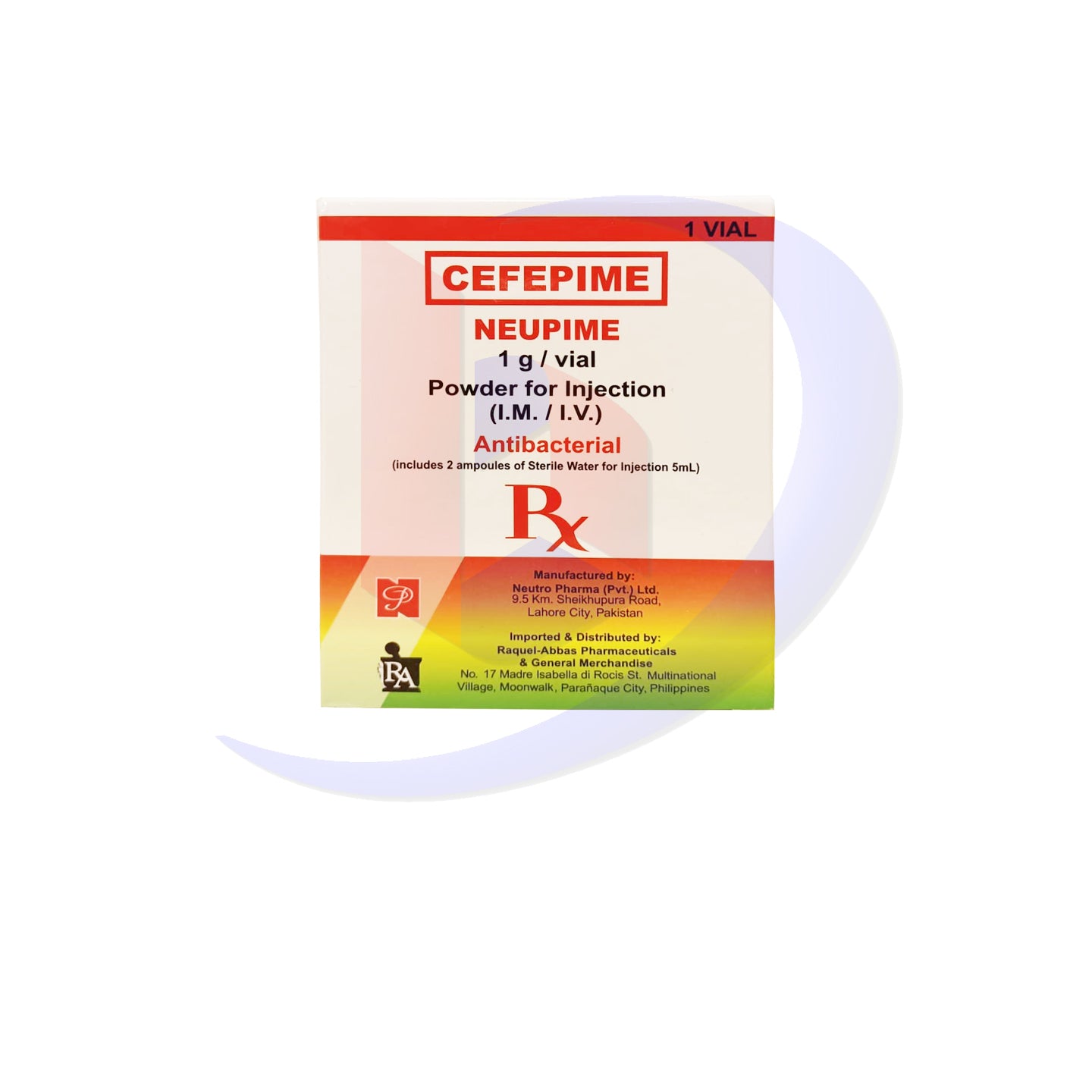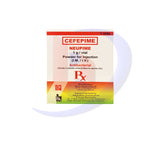Bambang Pharmaceutical Depot Inc.
NEUPIME Cefepime 1g / Vial Powder for Injection (I.M/I.V) Vial 1's
NEUPIME Cefepime 1g / Vial Powder for Injection (I.M/I.V) Vial 1's
Couldn't load pickup availability
Below is the detailed information for Cefepime (Neupime) 1g / Vial Powder for Injection (I.M/I.V) Vial 1's:
Product Description:
Cefepime (Neupime) 1g Powder for Injection is a broad-spectrum cephalosporin antibiotic that is used for the treatment of various bacterial infections. Cefepime is effective against both gram-positive and gram-negative bacteria. This medication comes in a 1g vial in the form of a powder that is reconstituted with a sterile solvent for intravenous (IV) or intramuscular (IM) administration.
Cefepime works by inhibiting the synthesis of the bacterial cell wall, leading to the destruction of the bacteria. It is commonly used for serious infections, especially in hospitalized patients or those who have compromised immune systems.
Indications:
Cefepime (Neupime) is indicated for the treatment of the following bacterial infections caused by susceptible organisms:
-
Respiratory Tract Infections:
-
Community-acquired pneumonia (CAP).
-
Hospital-acquired pneumonia (HAP).
-
Acute bacterial exacerbations of chronic bronchitis.
-
-
Urinary Tract Infections (UTIs):
-
Including complicated UTIs and pyelonephritis.
-
-
Skin and Soft Tissue Infections:
-
Cellulitis, wound infections, and other soft tissue infections caused by susceptible organisms.
-
-
Intra-abdominal Infections:
-
Including peritonitis, intra-abdominal abscesses, and other related infections.
-
-
Febrile Neutropenia:
-
As part of the treatment for infections in immunocompromised patients, such as those undergoing chemotherapy.
-
-
Bacteremia:
-
Treatment of bacteremia (infection in the blood) when caused by susceptible bacteria.
-
Dosages:
The dosage of Cefepime (Neupime) depends on the severity and type of infection, as well as the patient’s renal function. Below are the general dosing guidelines:
For Adults:
-
Mild to Moderate Infections:
-
1g every 12 hours (IV/IM).
-
-
Severe Infections:
-
2g every 12 hours (IV/IM).
-
-
Bacteremia:
-
2g every 12 hours (IV), may be adjusted depending on infection severity.
-
-
Febrile Neutropenia:
-
2g every 12 hours (IV).
-
-
Complicated Urinary Tract Infections:
-
1g every 12 hours (IV/IM), may increase to 2g every 12 hours for more severe cases.
-
For Pediatric Patients (2 months to 12 years):
-
1g every 12 hours (IV/IM) is typically used, but dosage may vary depending on the infection and severity.
-
For severe infections, 2g every 12 hours may be required.
Renal Impairment:
-
Creatinine clearance should be considered when adjusting doses. In patients with renal impairment, the dosage may need to be reduced, and the dosing interval extended based on the severity of the kidney dysfunction.
Note: Cefepime is usually administered via intravenous (IV) infusion or intramuscular (IM) injection after reconstitution. IV infusion typically lasts 30 minutes for the recommended dose.
Side Effects:
Common side effects of Cefepime (Neupime) may include:
Common Side Effects:
-
Gastrointestinal Disturbances:
-
Nausea, vomiting, diarrhea, or abdominal pain.
-
-
Injection Site Reactions:
-
Pain, redness, or swelling at the injection site.
-
-
Headache or dizziness.
Serious Side Effects:
-
Allergic Reactions:
-
Symptoms such as rash, itching, hives, swelling of the face, lips, or throat, or difficulty breathing. These may indicate a severe allergic reaction (anaphylaxis) and require immediate medical attention.
-
-
Clostridium difficile-associated Diarrhea:
-
Prolonged use of antibiotics like Cefepime can disrupt the normal bacterial flora of the intestines, leading to C. difficile infection, resulting in severe diarrhea or colitis.
-
-
Neurotoxicity:
-
In patients with renal insufficiency, Cefepime can cause central nervous system toxicity, leading to symptoms such as confusion, seizures, myoclonus, or coma.
-
-
Hematologic Effects:
-
Leukopenia, neutropenia, or thrombocytopenia (low white blood cell or platelet counts), which may increase the risk of infections or bleeding.
-
-
Kidney Dysfunction:
-
Prolonged or high doses of Cefepime can affect kidney function, especially in those with pre-existing renal impairment.
-
Contraindications:
Cefepime (Neupime) should be avoided or used with caution in the following conditions:
-
Hypersensitivity to Cephalosporins:
-
Do not use in patients who have a known allergy to cephalosporins or other beta-lactam antibiotics (such as penicillin).
-
-
Renal Impairment:
-
Cefepime should be used with caution in patients with renal impairment as it can accumulate in the body, increasing the risk of adverse effects, particularly neurotoxicity.
-
-
Allergic Reactions to Beta-Lactams:
-
A history of anaphylaxis or severe allergic reactions to other beta-lactam antibiotics (like penicillins or carbapenems) may increase the risk of cross-reactivity. Cefepime should be avoided in these patients unless absolutely necessary.
-
-
Pregnancy:
-
Cefepime falls under Category B (according to FDA classification) for pregnancy, which means it has not been shown to cause harm to the fetus in animal studies. However, it should only be used during pregnancy when clearly needed and under a healthcare provider’s guidance.
-
-
Breastfeeding:
-
Cefepime is excreted in breast milk, but there is no significant evidence of harm to infants. However, it should be used cautiously in breastfeeding mothers, and breastfeeding should be monitored for any signs of adverse effects on the infant.
-
-
Children Under 2 Months:
-
The safety and efficacy of Cefepime in infants under 2 months old have not been established. Use in this population should be determined by a healthcare provider.
-
Precautions:
-
Superinfection:
-
Prolonged use of Cefepime may result in overgrowth of non-susceptible organisms, leading to superinfections, including fungal infections and C. difficile-associated diarrhea.
-
-
Severe Diarrhea:
-
If severe diarrhea develops during or after treatment, consider Clostridium difficile-associated diarrhea, and appropriate management should be considered, including discontinuation of Cefepime.
-
-
Seizure Risk:
-
Cefepime can increase the risk of seizures in patients with renal insufficiency or those receiving high doses. Close monitoring of renal function and serum drug levels is important.
-
-
Renal Function Monitoring:
-
Regular monitoring of renal function is advised in patients receiving Cefepime, especially those with pre-existing kidney conditions, to avoid accumulation and reduce the risk of toxicity.
-
-
Drug Interactions:
-
Cefepime may interact with other medications such as aminoglycoside antibiotics, which can increase the risk of kidney damage. It may also interfere with probenecid, which may increase Cefepime levels in the blood. Always inform your healthcare provider about any other medications you are taking.
-
Summary:
Cefepime (Neupime) is a broad-spectrum cephalosporin antibiotic used for the treatment of serious bacterial infections such as pneumonia, urinary tract infections, skin infections, and bacteremia. It is administered intravenously (IV) or intramuscularly (IM).
-
Indications: Respiratory infections, UTIs, skin infections, bacteremia, and febrile neutropenia.
-
Dosage: Generally 1g every 12 hours for mild to moderate infections; up to 2g every 12 hours for more severe infections.
-
Side Effects: Includes gastrointestinal symptoms, allergic reactions, neurotoxicity, and kidney issues in susceptible patients.
-
Contraindications: Allergy to cephalosporins, renal impairment, and pregnancy (use only if necessary).
Use Cefepime (Neupime) under medical supervision, especially for long-term or high-dose therapy, to ensure effective treatment and avoid serious side effects. Always consult a healthcare provider before starting or adjusting the dosage of this medication.
Share

Collapsible content
🛡️ Discreet and Confidential Packaging
At Bambang Pharmaceutical Depot Inc., we understand that ordering medicines is a private matter. That’s why we go the extra mile to ensure discreet, secure packaging for every order. No product names or sensitive information appear on the outside of your package — not even our couriers know what’s inside.
Your privacy is our top priority. We adhere to strict confidentiality protocols to protect your personal and order information. We never share your details with third parties, and every step of our process is built on trust, security, and respect for your privacy.
✔️ Discreet packaging for all deliveries
✔️ 100% confidential ordering process
✔️ No product labels or identifiers on packaging
✅ FDA-Registered Medicines Only
Bambang Pharma is committed to your health and safety. All products we offer are fully registered with the Philippine FDA, ensuring you receive only authentic and high-quality medications.
We do not sell unregistered or counterfeit medicines — ever. Each product undergoes verification, and you can independently confirm its FDA status.
🧾 Genuine medicines with verified FDA approval
🔍 FDA Registration Number provided for transparency
🔒 Trusted by thousands of Filipino customers nationwide
🏥 FDA-Licensed Online Pharmacy
As a fully licensed FDA distributor, Bambang Pharmaceutical Depot Inc. is authorized to sell medicines online and deliver nationwide. You can shop with confidence knowing you’re buying from a legal, secure, and government-accredited source.
We are listed in the FDA’s Certificates and Permits section, affirming our compliance with all regulations for pharmaceutical distribution.
For all your Pharma and Medical Needs!
-
MEDICINES
We offer large range of generics and branded tablets, capsules, topicals, suppositories, drops or suspensions, inhalers and injections.
-
SUPPLEMENTS
High quality yet very affordable vitamins and minerals, specialty supplements, herbals and botanicals, sports nutrition, and weight management.
-
MEDICAL SUPPLIES
We serve all types of medical supplies needed in clinics, laboratories, and hospitals like cottons, gauze, alcohol, swabs, gloves, bandages, lancets, glucometer, etc.
-
MEDICAL EQUIPMENT
We also serve durable and affordable medical devices and equipment needed in clinics, laboratories and hospitals.


